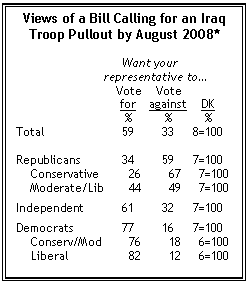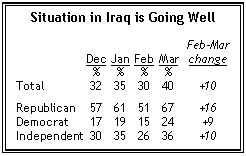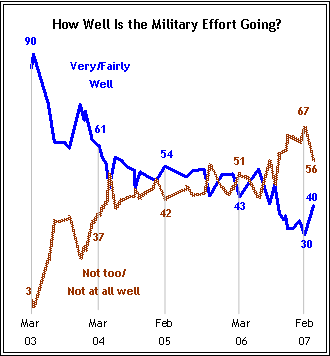Summary of Findings
 A solid majority of Americans say they want their congressional representative to support a bill calling for a withdrawal of U.S. forces from Iraq by August 2008. Nearly six-in-ten (59%) say they would like to see their representative vote for such legislation, compared with just 33% who want their representative to oppose it.
A solid majority of Americans say they want their congressional representative to support a bill calling for a withdrawal of U.S. forces from Iraq by August 2008. Nearly six-in-ten (59%) say they would like to see their representative vote for such legislation, compared with just 33% who want their representative to oppose it.
 Democrats are united in their support of legislation calling for a U.S. troop withdrawal by August 2008, and most independents (61%) also favor this step. Most Republicans oppose this step, but there are substantial divisions within the GOP. More than four-in-ten moderate and liberal Republicans (44%) want their representative to vote for legislation calling for an August 2008 deadline for a troop withdrawal, compared with only about a quarter of conservative Republicans (26%).
Democrats are united in their support of legislation calling for a U.S. troop withdrawal by August 2008, and most independents (61%) also favor this step. Most Republicans oppose this step, but there are substantial divisions within the GOP. More than four-in-ten moderate and liberal Republicans (44%) want their representative to vote for legislation calling for an August 2008 deadline for a troop withdrawal, compared with only about a quarter of conservative Republicans (26%).
 Even as the public registers strong support for a congressional deadline for withdrawing U.S. forces, there has been a modest rise in optimism about conditions in Iraq. Four-in-ten Americans say that the U.S. military effort in Iraq is going very or fairly well, up 10 points from February, when positive perceptions reached an all-time low. The shift has come disproportionately among Republicans (up 16 points), though independents and Democrats also are more positive about the situation in Iraq than they were in February (up 10 and nine points, respectively).
Even as the public registers strong support for a congressional deadline for withdrawing U.S. forces, there has been a modest rise in optimism about conditions in Iraq. Four-in-ten Americans say that the U.S. military effort in Iraq is going very or fairly well, up 10 points from February, when positive perceptions reached an all-time low. The shift has come disproportionately among Republicans (up 16 points), though independents and Democrats also are more positive about the situation in Iraq than they were in February (up 10 and nine points, respectively).
The latest nationwide survey by the Pew Research Center for the People & the Press, conducted March 21-25 among 1,503 Americans, finds that opinions about the impact of President Bush’s troop surge in Iraq — like nearly every other issue relating to the war — are deeply divided along partisan lines.
Most Republicans (53%) believe that the troop increase put in place by George W. Bush is already making things better in Iraq, and 68% say that the surge will make things better in the long run. Democrats are dubious that the troop increase is either currently improving the situation in Iraq, or will have a positive effect in the future.
 Independents are generally skeptical the troop increase is making things better now, but 38% believe that the surge will make things better in the long run.
Independents are generally skeptical the troop increase is making things better now, but 38% believe that the surge will make things better in the long run.
Congress and Iraq
While Democrats and Republicans disagree over what Congress should do about Iraq, there is bipartisan criticism of Congress’s handling of the issue to date. Nearly three-quarters of Americans (73%) — including 77% of Republicans, 78% of independents and 66% of Democrats — say Congress is doing only a fair or poor job dealing with Iraq. Just 22% say Congress has done an excellent (3%) or good job (19%) in this regard.
 For Democrats, much of this frustration is linked to the sense that Congress has too little influence on Iraq policy, and has not aggressively challenged President Bush’s approach. Most Democrats (56%) believe that Congress should have “a lot of influence” over the direction of U.S. policy in Iraq, and an identical number says that Democratic leaders in Congress have not gone far enough in challenging George W. Bush’s policies.
For Democrats, much of this frustration is linked to the sense that Congress has too little influence on Iraq policy, and has not aggressively challenged President Bush’s approach. Most Democrats (56%) believe that Congress should have “a lot of influence” over the direction of U.S. policy in Iraq, and an identical number says that Democratic leaders in Congress have not gone far enough in challenging George W. Bush’s policies.
Many independents share these criticisms — a plurality (41%) says that Democratic leaders in Congress are not going far enough in challenging Bush’s Iraq policies. As expected, most Republicans (52%) think that Democratic leaders are going too far in challenging the president’s Iraq policies. In addition, while most Republicans (51%) want Congress to have some influence over the direction of U.S. policy in Iraq, relatively few want Congress to have a lot of influence.
The U.S. Attorney Firings
Public reaction to the controversy over the firing of eight U.S. attorneys by the Justice Department has been fairly muted. The Pew Research Center for the People & the Press has tracked public interest in the story on a weekly basis, and has found only modest public attention to the story — far less than the attentiveness to the situation in Iraq or the problems at Walter Reed Army Hospital.1
 In the current survey, 33% report having heard a lot about the firings and questions about how Alberto Gonzales and the White House handled them. Nearly two-thirds have heard a little (43%) or nothing at all (22%) about the issue.
In the current survey, 33% report having heard a lot about the firings and questions about how Alberto Gonzales and the White House handled them. Nearly two-thirds have heard a little (43%) or nothing at all (22%) about the issue.
With attention fairly low, the public remains uncertain about Gonzales’ fate. About as many believe that Gonzales should lose his job (30%) as say he should keep it (31%). But a plurality (39%) has no opinion on the matter. When the analysis is limited to those who have heard “a lot” about the story, opinions remain divided, with stronger partisan reactions. Among the third of the public most engaged with the story, 44% favor Gonzales resigning or otherwise losing his job, while 42% are opposed. Republicans tracking the story oppose Gonzales’ being fired or resigning by a margin of 81% to 11%, while highly engaged Democrats favor his departure by a margin of 66% vs. 21%.


